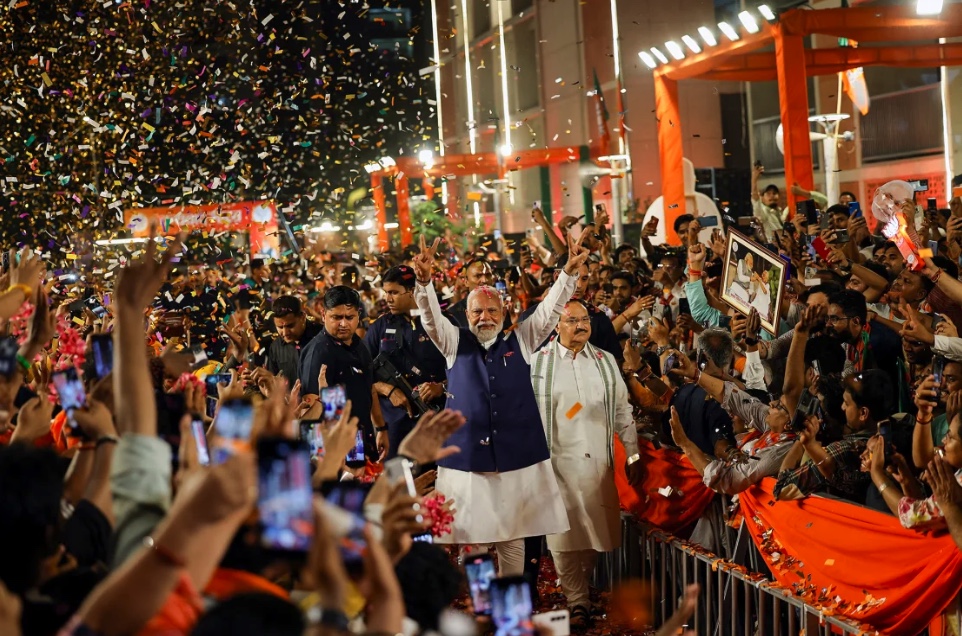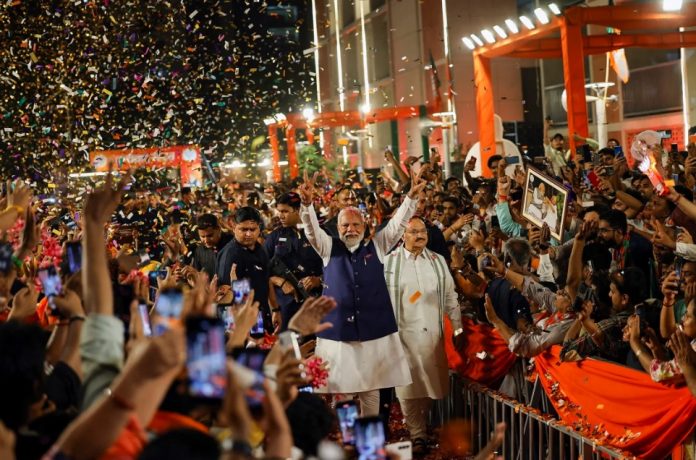นายกรัฐมนตรี นเรนทรา โมดี ผู้นำการเปลี่ยนแปลงแต่สร้างความแตกแยกของอินเดีย ประกาศชัยชนะในการเลือกตั้งระดับชาติเมื่อเย็นวันอังคาร อย่างไรก็ตาม เป้าหมายของเขาในการได้รับเสียงข้างมากที่ไม่มีใครโจมตีได้ต้องพังทลายลง เนื่องจากผู้มีสิทธิเลือกตั้งให้ผลลัพธ์ที่น่าประหลาดใจซึ่งทำให้อำนาจครอบงำพรรคของเขาลดลง โมดีจะจัดตั้งรัฐบาลโดยได้รับการสนับสนุนจากพันธมิตรพันธมิตรประชาธิปไตยแห่งชาติ National Democratic Alliance (NDA) ของเขา นับเป็นสมัยที่ 3 ติดต่อกัน และผนึกสถานะของเขาในฐานะนักการเมืองหลังได้รับเอกราชที่ประสบความสำเร็จ อย่างไรก็ตาม Bharatiya Janata Party (BJP) ยังขาดที่นั่ง 272 ที่นั่งที่จำเป็นสำหรับเสียงข้างมากโดยสมบูรณ์ โดยได้เพียง 240 ที่นั่งภายในจำนวนที่นั่งทั้งหมดของ NDA ที่ 292 ที่นั่ง ความพ่ายแพ้นี้บังคับให้พวกเขาต้องพึ่งพาพันธมิตรแนวร่วม ซึ่งกระทบต่อปณิธานส่วนตัวของโมดี
ฝ่ายค้านของอินเดีย ซึ่งก่อนหน้านี้ถูกไล่ออกจากการเลือกตั้งและโดยนักวิเคราะห์ มองว่าผลการเลือกตั้งเป็นการปฏิเสธผู้นำที่แตกแยกของโมดี ราหุล คานธี ผู้นำสภาแห่งชาติ อ้างว่าผลการเลือกตั้งในช่วงแรกระบุว่าประเทศนี้ระบุการต่อต้านโมดีและการปกครองของพรรคเขาอย่างเป็นเอกฉันท์และชัดเจน พันธมิตรที่นำโดยสภาคองเกรสมุ่งเป้าที่จะโค่นล้มโมดี และแม้ว่าพวกเขาจะดูขาดความพร้อม แต่พวกเขาก็ได้ลดทอนภาพลักษณ์ของเขาในเรื่องการอยู่ยงคงกระพันในการเลือกตั้ง ผลการวิจัยพบว่าพวกเขารุกเข้าสู่ที่นั่งของ BJP แม้กระทั่งในฐานที่มั่นดั้งเดิมของพรรครัฐบาลบางแห่งก็ตาม ในขณะเดียวกัน หุ้นอินเดียร่วงลงในวันอังคาร เนื่องจากความหวังของ โมดี สำหรับชัยชนะอย่างถล่มทลายจางหายไป ทำให้เกิดข้อสงสัยในความสามารถของเขาในการดำเนินการปฏิรูปเศรษฐกิจเชิงรุก
แม้ว่าจำนวนผู้ออกมาใช้สิทธิ์จะลดลงเล็กน้อยจากระดับสูงสุดเป็นประวัติการณ์ในปี 2562 แต่ชัยชนะในระยะที่สามของ Modi ก็ตอกย้ำถึงความนิยมของเขา สำหรับผู้สนับสนุนหลายล้านคน Modi วัย 73 ปีคือไอคอนที่เปลี่ยนแปลงชีวิตและส่งเสริมการเคลื่อนไหวทางสังคม ในช่วงทศวรรษที่ผ่านมา ฝ่ายบริหารของเขาได้ยกระดับเครือข่ายการคมนาคม สร้างทางหลวง พัฒนาโรงไฟฟ้า และสงเคราะห์เงินกับบ้าน 40 ล้านหลังสำหรับคนยากจน อย่างไรก็ตาม การดำรงตำแหน่งของเขายังเป็นที่ถกเถียงกันอยู่ โดยมีเสียงวิพากษ์วิจารณ์เรื่องการยกเลิกเงินตรา (Demonetisation) การประท้วงของชาวนาจำนวนมาก และการรับมือกับการระบาดใหญ่ของโควิด-19 ซึ่งทำให้มีผู้เสียชีวิตมากกว่าครึ่งล้านคน ภายใต้การนำของโมดี การข่มเหงทางศาสนาและความหวาดกลัวอิสลามได้เพิ่มขึ้นอย่างรวดเร็ว โดยนักวิจารณ์กล่าวหาว่าเขาสนับสนุนการแบ่งแยกนิกายเพื่อส่งเสริมวาระชาตินิยมฮินดู-ชาตินิยมของพรรคของเขา พวกเขาอ้างว่าเขากำลังขับไล่อินเดียออกจากรากเหง้าทางโลก เปลี่ยนให้เป็นรัฐฮินดูที่มีประชากรส่วนใหญ่ ซึ่งอาจมีผลกระทบเมื่อพิจารณาจากประวัติศาสตร์ความรุนแรงระหว่างชุมชนของอินเดีย
ชัยชนะของโมดีดังก้องไปทั่วโลก โดยดึงดูดความสนใจจากสหรัฐอเมริกา จีน และรัสเซีย เนื่องจากตำแหน่งทางยุทธศาสตร์และเศรษฐกิจที่เฟื่องฟูของอินเดีย วอชิงตันมองว่านิวเดลีเป็นกุญแจสำคัญในการถ่วงดุลจีนที่กล้าแสดงออกอย่างเหมาะสม แต่อินเดียยังคงรักษาความสัมพันธ์ใกล้ชิดกับมอสโก โดยซื้อน้ำมันรัสเซียราคาถูก แม้ว่ายูเครนจะรุกรานและถูกมาตราการลงโทษจากตะวันตกด้วยก็ตาม โมดีตั้งเป้าที่จะเปลี่ยนอินเดียให้เป็นประเทศที่พัฒนาแล้วภายในปี 2590 ซึ่งเป็นวันครบรอบหนึ่งร้อยปีแห่งอิสรภาพจากการปกครองของอังกฤษ ในขณะที่เศรษฐกิจและแรงงานรุ่นใหม่ของอินเดียกำลังเติบโต การว่างงานของเยาวชนก็อยู่ในระดับสูง และการกระจายความมั่งคั่งก็ไม่เท่าเทียมกัน แม้จะมีการลดอำนาจลง แต่ผู้สนับสนุนเชื่อว่า โมดี เหมาะสมที่สุดในการทำตามสัญญาทางเศรษฐกิจและยกระดับสถานะระดับโลกของอินเดีย
Modi secures victory for a third term in the Indian election.

India’s transformative yet divisive Prime Minister Narendra Modi declared victory in the national elections on Tuesday evening. However, his goal of securing an unassailable majority was dashed as voters delivered a surprising result that reduced his party’s dominance. Modi will form a government with the support of his National Democratic Alliance (NDA) allies, marking a third consecutive term and cementing his status as a successful post-independence politician. Despite this, the Bharatiya Janata Party (BJP) fell short of the 272 seats needed for an outright majority, securing only 240 seats within the NDA’s total of 292. This setback forces them to rely on coalition partners, a personal blow to Modi’s aspirations.
India’s opposition, previously dismissed in the polls and by analysts, framed the election outcome as a rejection of Modi’s divisive leadership. Rahul Gandhi, leader of the National Congress, claimed early results indicated that the country has “unanimously and clearly” stated its opposition to Modi and his party’s governance. The Congress-led alliance aimed to unseat Modi, and although they appear to have fallen short, they have diminished his image of electoral invincibility. The results show they have made inroads into BJP seats, even in some of the ruling party’s traditional strongholds. Meanwhile, Indian stocks plunged on Tuesday as Modi’s hopes for a landslide victory faded, casting doubt on his ability to implement aggressive economic reforms.
Though turnout dipped slightly from 2019’s record levels, Modi’s third-term victory highlights his popularity. To his millions of supporters, 73-year-old Modi is an icon who has transformed lives and promoted social mobility. Over the last decade, his administration has upgraded the transport network, built highways, developed power plants, and subsidised 40 million homes for the poor. However, his tenure has been controversial, marked by criticism for demonetisation, massive farmer protests, and the handling of the Covid-19 pandemic, which led to over half a million deaths. Under Modi’s leadership, religious persecution and Islamophobia have sharply increased, with critics accusing him of endorsing sectarianism to further his party’s Hindu-nationalist agenda. They claim he is steering India away from its secular roots, transforming it into a majoritarian Hindu state, which could have significant implications given India’s history of inter-communal violence.
Modi’s victory will resonate globally, drawing attention from the United States, China, and Russia due to India’s strategic position and booming economy. Washington views New Delhi as a key counterbalance to an assertive China, yet India maintains close ties with Moscow, buying cheap Russian oil despite the Ukraine invasion and Western sanctions. Modi aims to transform India into a developed nation by 2047, the centenary of independence from British rule. While India’s economy and young workforce are growing, youth unemployment is high, and wealth distribution is unequal. Despite a reduced mandate, supporters believe Modi is best suited to deliver economic promises and elevate India’s global status.
By CNN NEWS

















